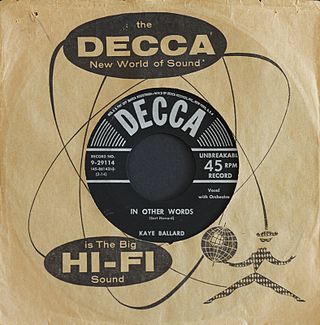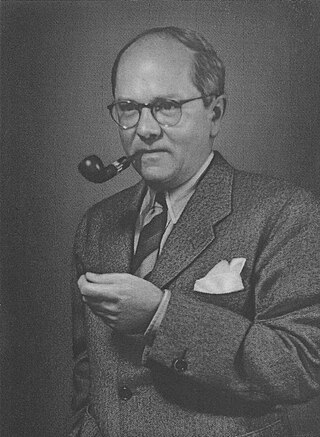This is a list of notable events in music that took place in the year 1962.

This is a list of notable events in music that took place in the year 1950.

"Fly Me to the Moon", originally titled "In Other Words", is a song written in 1954 by Bart Howard. The first recording of the song was made in 1954 by Kaye Ballard. Frank Sinatra's 1964 version was closely associated with the Apollo missions to the Moon.

Richard Armstrong Whiting was an American composer of popular songs, including the standards "Hooray for Hollywood", "Ain't We Got Fun?" and "On the Good Ship Lollipop". He also wrote lyrics occasionally, and film scores most notably for the standard "She's Funny That Way".
"I'm Walking Behind You" is a popular song which was written by Billy Reid and published in 1953. The recording by American singer Eddie Fisher was a No. 1 hit in both the US and UK Singles charts, but it had previously been recorded by Reid's former partner, Dorothy Squires, who had a hit with the song in the UK.
"Buttons and Bows" is a popular song with music written by Jay Livingston and lyrics by Ray Evans. The song was published on February 25, 1948 by Famous Music Corp., New York. The song was written for and appeared in the Bob Hope and Jane Russell film The Paleface and won the Academy Award for Best Original Song. It was originally written with an Indian theme, but was changed when the director said that would not work in the movie. It was a vocal selection on many radio programs in late 1948. It was reprised in the sequel, Son of Paleface, by Roy Rogers, Jane Russell and Bob Hope. In 2004 it finished #87 in AFI's 100 Years...100 Songs survey of the top tunes in American cinema.

Dorothy Squires was a Welsh singer. Her early successes were achieved with "The Gypsy", "A Tree in the Meadow" and "I'm Walking Behind You" by her partner Billy Reid, and "Say It with Flowers" written by Squires with piano accompaniment by Russ Conway. Among her later well-known recordings were versions of "Till", "My Way", and "For Once in My Life". Other notable cover songs included "A Lovely Way to Spend an Evening", "I'm in the Mood for Love", "Anytime", "If You Love Me " and "And So to Sleep Again".
William Gordon Reid was an English songwriter, bandleader, pianist and accordionist. He was the first British songwriter to reach the top of the US music chart, with The Ink Spots' 1946 recording of "The Gypsy", and was known for his close association with the singer Dorothy Squires, for whom he wrote that and many other songs.
"The Gypsy" is a popular song written by Billy Reid and published in 1945. The ballad tells the story of a person who visits a Gypsy fortune teller and is reassured that their partner is faithful. Though they both know it to be untrue, the narrator resolves to return, "'Cause I want to believe the Gypsy".
Conspiracy was a progressive rock band founded by Chris Squire and Billy Sherwood. The band released two albums: Conspiracy (2000) and The Unknown (2003), and a live DVD (2006).

"My Buddy" is a popular song with music written by Walter Donaldson, and lyrics by Gus Kahn. The song was published in 1922 and early popular versions were by Henry Burr (1922), Ernest Hare (1923) and Ben Bernie.

"I'll Get By (As Long as I Have You)" is a popular song with music by Fred E. Ahlert and lyrics by Roy Turk that was published in 1928. Versions by Nick Lucas, Aileen Stanley and, most successfully, Ruth Etting, all charted in America in 1929.
"Now Is the Hour" is a popular song from the early 20th century. Often erroneously described as a traditional Māori song, its creation is usually credited to several people, including Clement Scott (music), and Maewa Kaihau and Dorothy Stewart.

The Swingin' Miss D is the sixth studio album by Dinah Washington, arranged by Quincy Jones. It was recorded in December 1956 and released in September 1957.
Jules Leonard "Buddy" Kaye was an American songwriter, lyricist, arranger, producer, and author. His songs were recorded by top performers, including Frank Sinatra, Bob Dylan, Sarah Vaughan, Dinah Washington, Ella Fitzgerald, The McGuire Sisters, Glenn Miller, Sammy Kaye, Perry Como, Elvis Presley, Charles Aznavour, Tony Bennett, Cliff Richard, Pat Boone, Harry Belafonte, Bobby Darin, Little Richard, Barry Manilow, Karen Carpenter, Diana Krall, and Dusty Springfield. He scored number-one hits on the Billboard charts in 1945 with "Till The End Of Time", recorded by Perry Como, and in 1949 with "'A' You're Adorable ", recorded by Como and The Fontane Sisters. Among his most recognizable tunes in pop culture are the theme songs to the Famous Studios theatrical cartoons Little Lulu and Little Audrey; the international hit song "Speedy Gonzales", recorded by Pat Boone; and the co-written theme song to the television series I Dream of Jeannie. In 1976, he won a Grammy Award for best children's album for his production of The Little Prince, narrated by Richard Burton.

The Sweetheart Tree is an album by American pop singer Johnny Mathis that was released by Mercury Records on September 30, 1965, and included songs associated with Italy, France, Ireland, and Scotland as well as several selections, such as "I'll Close My Eyes" and "The Very Thought of You", from English composers.

My Thanks to You is a studio album recorded by American entertainer Connie Francis. The album features songs which had been popular on both sides of the Atlantic between the 1920s and the 1940s. It was recorded March 4–6, 1959, at EMI's famous Abbey Road Studios in London.

Stone Blues is an album by American saxophonist Ken McIntyre. It was the first record that McIntyre recorded, done in 1960 for the New Jazz label, although it was released in 1962, subsequent to the release of Looking Ahead.
"Beautiful Brown Eyes" is a country song written by Alton Delmore, originally inspired by his oldest daughter. One of the best known versions of the song was originally arranged by Fiddlin' Arthur Smith & Alton Delmore of The Delmore Brothers in 1951. An award was presented to Alton Delmore for "Beautiful Brown Eyes" in 1951.

I'll Close My Eyes is an album by guitarist Doug Raney recorded in 1982 and released on the Danish label, SteepleChase.










